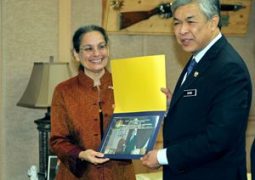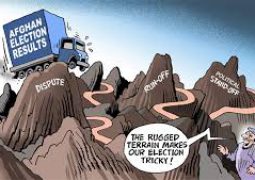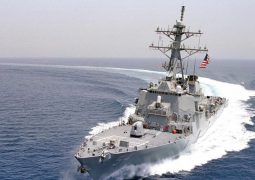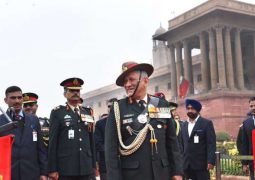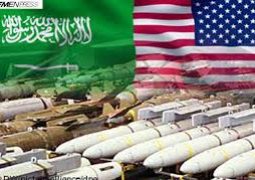New opening in US-China trade war: Trump administration plans $8 billion fighter jet sale to Taiwan
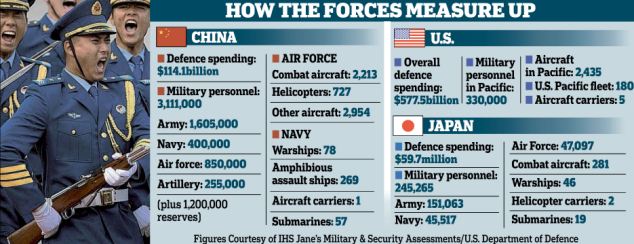

Seven F-16 fighter jets taxi on a runway at Taiwan’s Hualien air base. The United States has not sold new fighter jets to Taiwan since 1992. (Richard Chung/Reuters)
The Trump administration is pressing ahead with an $8 billion sale of new F-16 fighter jets to Taiwan, a move likely to raise strong objections from China amid the deepening trade dispute between Washington and Beijing.
The State Department submitted the package to Congress for informal review late Thursday, and it is not expected to meet opposition, according to several U.S. officials and other people familiar with the matter. It would be the largest and most significant sale of weaponry to Taiwan in decades.
The deal has been in the works for months, and lawmakers from both political parties had questioned whether the White House would scuttle it with hopes of softening the ground for a U.S.-China trade pact or otherwise seek to use the jets as a bargaining chip in the deadlocked negotiations.
Neither the White House nor the State Department responded to requests for comment.
Sen. Marco Rubio (R-Fla.), a member of the Senate Foreign Relations Committee, hailed the move in a statement Friday, calling it “an important step in support of Taiwan’s self-defense efforts.”
Likewise, House Foreign Affairs Committee Chairman Eliot L. Engel (D-N.Y.) and ranking Republican Michael McCaul (Tex.) said in a statement that the sale “sends a strong message about the U.S. commitment to security and democracy in the Indo-Pacific.”
The Chinese Embassy did not respond to a request for comment, but Beijing has repeatedly expressed its hostility to such deals.
“China’s position to firmly oppose arms sales to Taiwan is consistent and clear,” Chinese Foreign Ministry spokesman Geng Shuang said in March, after press reports that the Trump administration had tacitly approved the sale. “We have made stern representations to the U.S. We have urged the U.S. to fully recognize the sensitivity of this issue and the harm it will cause.”
Taiwan split from China in 1949 and set up a rival government in Taipei. Beijing continues to view the self-governing island as a renegade state that will one day return to China. To prevent an outbreak of hostilities that would draw in the United States, every president since Richard Nixon has acknowledged the Chinese position that Taiwan is part of China, but continues to have unofficial relations with Taiwan.
Some experts said that advancing the arms sale now, amid stalled trade talks and pro-democracy protests in Hong Kong, will exacerbate the already fraught U.S.-China relationship. They also fear that the sale could result in China imposing sanctions on U.S. defense companies that sell arms to Taiwan and do business in China.
“Taiwan’s defense is intrinsically important to the United States, but the timing of this move, amid the trade war and major instability in Hong Kong, is exceptionally precarious,” said Evan Medeiros, former White House senior director for Asia in the Obama administration and a professor at Georgetown University. “It will make trade negotiations and managing the Hong Kong situation even harder than it already is.”
He added that it would also fuel conspiracy theories that the United States is behind the unrest in Hong Kong, a semiautonomous part of China. Observers fear that China could launch a military crackdown there. Such a crackdown could embolden Beijing to confront Taiwan.
China last month accused the United States of a “vain plot” to arm the island after the Trump administration approved a $2.2 billion sale of Abrams tanks and Stinger surface-to-air missiles and allowed Taiwan’s leader to visit New York.
Taiwan requested 66 American-made fighter jets. The United States has not sold new fighter jets to Taiwan since 1992. This month, the congressional delegation from South Carolina, which includes Senate Foreign Relations Committee member Lindsey O. Graham (R), sent a letter to the president urging him to support the sale. The lawmakers said the deal would be “critical” to sustaining thousands of jobs in their state.
Bonnie Glaser, senior adviser for Asia at the Center for Strategic and International Studies, played down the risk of a Chinese overreaction to the advancing arms deal. “China never likes U.S. arms sales to Taiwan. Will they object? Yes. Is this going to trigger a crisis in the relationship? No. This in and of itself is not going to derail progress on a trade agreement.”
She said the new aircraft would be comparable in capability to F-16 jet upgrades approved by the Obama administration. “This is not a new capability,” she said.
Eric Sayers, an adjunct senior fellow at the Center for a New American Security and a former aide to Sen. John McCain (R-Ariz.), who before his death last year led the powerful Armed Services Committee, credited the administration with “returning to a normalized process where arms sales to Taiwan are considered individually instead of packaged into large bundles and delayed for years.”
However, he said, the enormous price tag will put the onus on Taiwan to grow its $12 billion defense budget to sustain key spending on training and personnel.
Other experts have questioned the operational utility of fighter jets for Taiwan, given its relatively small defense budget compared with Beijing’s, and have argued that the money would be better spent on asymmetric defense capabilities, such as missiles, mines and air-defense weapons.
Both Medeiros and Glaser noted Beijing’s previous threats to sanction U.S. companies that sell arms to Taiwan. Though China has not acted in the past, Glaser said, “there is some possibility that they will follow through on their threat this time.”
The Chinese government accused the Trump administration of “playing the ‘Taiwan card’ ” last month when Taiwanese President Tsai Ing-wen visited New York.
Trump took the unusual step of speaking by phone with Tsai in 2016 when he was president-elect, alarming China. Since then he has courted a warm relationship with Chinese President Xi Jinping and said little about Taiwan.
Tsai faces reelection next year and is casting her leadership as a counterpoint to an increasingly repressive and assertive mainland China. This has endeared her to Trump administration officials who are hawkish on China, but Trump’s own views are unclear.
- Previous Inia isolates Kashmir by shutting down
- Next Talks with Taliban advance, say experts. Is US withdrawing from Afghanistan now?



